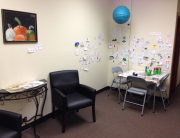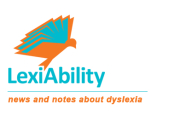The least predictive way to assess for dyslexia is reading. It is much more telling to look at…
• poor spelling
• speech issues (i.e. not having ten words by one year)
• l/f-th/m-n/b-d-p confusion (needing speech therapy)
• mixing up syllables like “mazagine” and “aminal”)
• directionality issues
• difficulty with rote information and arbitrary sequencing (multiplication, alphabetizing),
• family history of those who unexpectedly struggled in school (“They were so smart…but…”).
If your child is struggling with reading, then it is most likely that they have dyslexia. But, if your child is not struggling with reading, it does not mean they don’t have dyslexia!
Please do not wait for your child to fail in order to seek help. If you think your child is a “pretty good reader” and just needs to “try harder”, email us at info@readkc.com for a parent interview. We can help you accurately assess whether or not your student fits the profile of someone with dyslexia.






Connect with LexiAbility
RSS
Facebook
Twitter